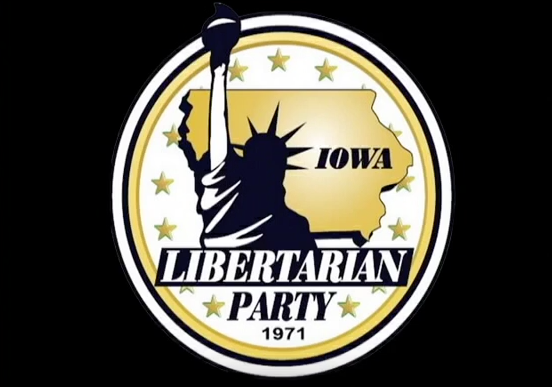The Libertarian Party of Iowa has full political party status for the first time this election cycle, thanks to a record-breaking showing here by presidential candidate Gary Johnson in 2016. But Libertarians are far from fielding anything close to a full slate of candidates for state offices.
The main benefit of being a “political party” under Iowa law, rather than a “non-party political organization,” is being able to run candidates in the primary. Before 2018, Libertarians could nominate candidates only for our state’s general election ballot.
The filing period for major-party candidates closed on March 16. Libertarians will have one competitive primary: gubernatorial hopefuls Marco Battaglia and Jake Porter both qualified for the ballot. No other Libertarian candidates filed to seek statewide offices.
The party has candidates in two of Iowa’s four Congressional districts: Bryan Jack Holder in IA-03 and Charles Aldrich in IA-04.
Two Libertarians are running for the state Senate, both in districts where no Republican filed: Eric Cooper (Senate district 23) and Carl Krambeck (Senate district 37). Seven Libertarians are seeking Iowa House seats:
Marrianna Collins (House district 34)–no Republican candidate
Patrick Shaw (House district 47)
John Evans (House district 49)
Lucas Link (House district 57)
John George (House district 75)
Nicholas Ryan (House district 79)–note that he is not the famous Iowa Republican operative Nick Ryan
David Melchert, Jr. (House district 97)
That’s barely more than the number of Libertarians who ran for office in Iowa in 2014, when the party had candidates for governor, U.S. Senate, IA-03, secretary of state, state treasurer, one Iowa Senate district, and five House districts.
More Iowans ran on the Libertarian ticket in 2016 than are on the 2018 ballot so far. In addition to the presidential/vice presidential team of Gary Johnson and Bill Weld, the party nominated candidates for U.S. Senate, IA-03, six state Senate seats, and twelve House seats two years ago.
Moreover, Libertarians appear to be struggling to reach beyond the “usual suspects” in their recruiting. Aldrich was the U.S. Senate nominee in 2016. Porter ran for secretary of state in 2010 and 2014. Cooper was the party’s gubernatorial candidate in 2010 and has run for Ames-based state legislative seats numerous times. George was nominated in Senate district 38 in 2016, and Melchert is a repeat candidate in his House district. Holder has run for Congress before and competed in multiple state legislative races as a third-party candidate.
If I were a Libertarian, I’d want to recruit candidates for as many offices as possible. More people pounding the pavement and raising awareness of the party’s ideology could help generate votes for the gubernatorial ticket later in the year. Either Porter or Battaglia will need to win at least 2 percent of the vote in November in order to maintain full political party status for Libertarians in the 2020 election cycle. Their last two candidates for governor won 1.3 percent in 2010 and just under 1.8 percent in 2014.
I’d also want competitive primaries for high-profile offices to drive primary turnout, because if an embarrassingly small number of voters participate in the statewide Libertarian primary on June 5, it will reinforce the narrative that the party is a marginal player. That won’t inspire media organizations to cover Libertarian candidates or include them in debates this fall.
In all likelihood, Libertarians will nominate more people for state legislative races and/or for statewide offices this summer, in time to get on the November ballot. But the party missed an opportunity to demonstrate that it is a real competitor to the two major parties and deserves the same kind of attention given to Democrats and Republicans.


3 Comments
No Surprise There
A political party whose foundation principle is to act like a petulant 12 year old boy will never act like anyrhing resembling a functional party.
dmnative Mon 19 Mar 7:11 PM
Attention
If “the same kind of attention given to Democrats and Republicans” means, in part, “media organizations asking Libertarians about specific policy positions,” I’d be in favor. I’ve been trying for years to find out how elected Libertarians would protect the environment, and so far the answer seems to be “they wouldn’t.”
PrairieFan Mon 19 Mar 9:39 PM
that's an important point
If you want people to treat you like a major political party, you need to have some positions on more than a few salient issues.
desmoinesdem Tue 20 Mar 9:16 AM